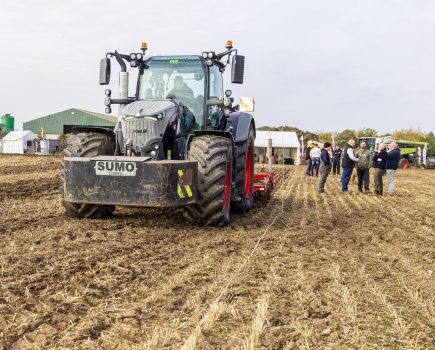Fendt made just 14,781 new tractors last year. Down by over 3,000 units (nearly 17%) on 2013’s record 17,837 tractors, chairman Peter-Josef Paffen of the AGCO/Fendt management board concedes last year was a challenge. “After several boom years, there was a considerable decline in the demand for tractors and agricultural machinery in many regions of the world last year,” he says. Mr Paffen would have liked to have made more tractors during 2014 but the market was simply not there, with sales of new tractors in Central and Western European falling from over 184,000 in 2013 to around 168,000 units (excludes Turkey) last year. Fortunately for Fendt, it did manage to maintain the same 8.4% share of the total market. While Austria and The Netherlands (two important markets for the German tractor maker) are experiencing a temporary downturn, Fendt saw its 2014 market share increase in Italy to 5.6%, the UK (6.7%), Scandinavia (6.8%), Spain (6.2%) and Switzerland (15.6%), and held onto the number one spot in its homeland with a 21.6% stake of the German tractor market. Despite the 25% slump in the French tractor market to 27,390 units, Fendt saw its share hit double digit figures for the first time last year – up from 7.9% in 2013 to 10.8%. The company’s 75 French dealers sold an average of 40 tractors with an average power of 176hp. Looking ahead to the remainder of this year, Fendt is operating on the assumption that the demand for agricultural machinery in Western and Central Europe, and also worldwide, may drop a bit during 2015. “We are expecting the markets to expand again starting 2016 and are making plans to further grow our share,” adds Mr Paffen. The drop in new tractor production at Marktoberdorf comes just a couple of years after a US$300 million investment by parent company AGCO, and a brand new tractor assembly line, which long-term paves the way to make as many as 25,000 new tractors a year. Speaking at a recent press conference, AGCO top man Martin Richenhagen says the investment has already been recuperated and the changes will allow Fendt to produce this year’s required volume of tractors from a single shift.
Tractor production tumbles but Fendt remains optimistic
Fendt made just 14,781 new tractors last year. Down by over 3,000 units (nearly 17%) on 2013’s record 17,837 tractors, chairman Peter-Josef Paffen of the AGCO/Fendt management board concedes last year was a challenge. “After several boom years, there was a considerable decline in the demand for tractors and agricultural machinery in many regions of […]






